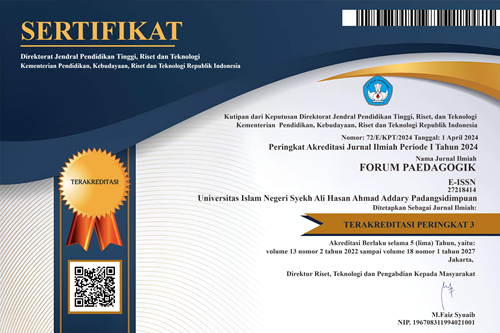A CRITICAL ASSESSMENT ON KUNTOWIJOYO’S PENGILMUAN ISLAM IN REFERENCE TO ISLAMIZATION OF KNOWLEDGE EDUCATIONAL PHILOSOPHY
Keywords : Islamization of knowledge; pengilmuan Islam; Kuntowijoyo.
Abidin, M. Z. (2016). Paradigma Islam Dalam Pembangunan Ilmu Integralistik: Membaca Pemikiran Kuntowijoyo. IAIN Antasari Press.
Acikgenc, A. (2014). Islamic Scientific Tradition in History. IKIM.
Ahmad, S. (2013). The Role of Language in the Process of Islamization: A Brief Analysis of Syed Muhammad Naquib al-Attas’ Thought. In Seminar Kebangsaan Isu Ketamadunan dan Cabaran Semasa (SIKCAS).
Al-Attas, S. M. N. (1980). The Concept of Education in Islam: A Framework for an Islamic Philosophy of Education. Ta’dib International.
______________. (2001). Risalah untuk Kaum Muslimin. ISTAC.
______________. (1993). Prolegomena to the Metaphysics of Islam. ISTAC.
Al-‘Alam, I. (2020). Tasawuf dan Tragedi: Kritik Kebudayaan Perspektif Syed Muhammad Naquib al-Attas. Bentala Tamaddun Press.
Al-Farūqī, I. R. (1980). Islamization of Knowledge: General Principles and Work Plan. IIIT.
____________. (1981) Islamizing the Social Sciences. In Lutpi Ibrahim ed., Islamika: esei-esei sempena abad ke-15 Hijriah. Sarjana Enterprise.
Ardiansyah, M. (2020). Konsep Adab Syed Muhammad Naquib Al-Attas dan Aplikasinya di Perguruan Tinggi. Yayasan Pendidikan Islam At-Taqwa Depok.
As-Suyuti, A. A. B. J. (1974). Al-itqan fi ‘ulum Al-Qur’ān. Vol. 3. Al-hai’ah al-misriyyah al-‘ammah Lil kitab.
Ali, M. M. (2018). Islamization of Modern Science and Its Philosophy: A Contemporary Civilizational Discourse. IIUM Press.
Arif, S. (2012). The Universe as a System: Ibn Sīnā’s Cosmology Revisited. In New Perspectives on the History of Islamic Science (pp. 53-72). Routledge.
Auda, J. (2021). Re-envisioning Islamic scholarship: Maqasid methodology as a new approach. Claritas Books.
Aziz, A., Khoiroh, M., Rochimah, Naily, N., Hamidah, L., Dzulhayatin, S. R. (2015). Gender, Islam, dan Budaya: Buku Saku. UIN Sunan Ampel Press.
Comte, A. (2009). A General View of Positivism. Cambridge University Press.
Daud, W. M. N. W. (2013). Islamization of Contemporary Knowledge and the Role of the University in the Context of De-Westernization and De-Colonization. A Professorial Lecture. Centre for Advanced Study on Islam, Science and Civilization (CASIS). University Technology Malaysia.
______________. (2019). Budaya Ilmu: Makna dan Manifestasi dalam Sejarah dan Masa Kini. CASIS.
Davutoglu, A. (1997). Alternative Paradigms: Impact of Islamic and Western Weltanschauungs in Political Theory. University Press of America.
Fahmi, M. (2005). Islam Transendental: Menelusuri Jejak-jejak Pemikiran Islam Kuntowijoyo. Pilar Media.
Hashim, R., & Rossidy, I. (2000). Islamization of knowledge: A comparative analysis of the conceptions of AI-Attas and AI-Fārūqī. Intellectual Discourse, 8(1).
Jubien, M. (1999). Contemporary Metaphysics: An Introduction. Blackwell Publishing.
Kausar, Z. (2016). Islamic Feminism Fully Exposed: Amina Wadud And Margot Badran vis-à-vis ʿAllama Yūsuf Al-Qaraḍāwī And Jamāl Badawī On Women’s Issues. TAFHIM: IKIM Journal of Islam and the Contemporary World, 9.
Kuhn, T. S. (1970). The Structure of Scientific Revolutions. University of Chicago Press.
Kuntowijoyo. (2002). Selamat Tinggal Mitos, Selamat Datang Realitas.
__________. (2006). Islam sebagai Ilmu: Epistemologi, Metodologi, dan Etika. Tiara Wacana.
__________. (2018). Muslim Tanpa Masjid: Mencari Metode Aplikasi Nilai-Nilai Al-Qur’ān pada Masa Kini. IRCiSoD.
Mufidah. (2014). Psikologi Keluarga Islam: Berwawasan Gender (Edisi Revisi). UIN Maliki Press.
Mobarak, M.M. (1988). al-Lughah Wujdan al-Ummah. Beirut: Al-Daʻwah.
Nasr, S. H. (1993). Spiritualitas dan Seni Islam. Mizan.
Ramadan, T. (2008). Radical Reform: Islamic Ethics and Liberation. Oxford University Press.
Suwondo, T. (2010). Kritik Sastra Indonesia dalam Jurnal Humaniora Tahun 2000-2008. In Workshop Forum Peneliti di Lingkungan Kemendiknas (pp. 472-490).
Syafrin, N. (2011). Konstruk Epistemologi Islam: Telaah Bidang Fiqh dan Ushul Fiqh. In Filsafat Ilmu: Perspektif Barat dan Islam (ed. Adian Husaini, et al.). Gema Insani Press.
Syarif, N. (2011). Konsep Ilmu dalam Islam. In Filsafat Ilmu: Perspektif Barat dan Islam (ed. Adian Husaini, et al.). Gema Insani Press.
Tomasello, M. (1999). The Cultural Origins of Human Cognition. Harvard University Press.
Vattimo, G. (1987). “Verwindung”: Nihilism and the Postmodern in Philosophy. Polity Press.
 Copyright (c) 2022 Ahmad Shidqi Mukhtasor, Jeihan Kamilla Rizal
Copyright (c) 2022 Ahmad Shidqi Mukhtasor, Jeihan Kamilla Rizal

This work is licensed under a Creative Commons Attribution-ShareAlike 4.0 International License.











